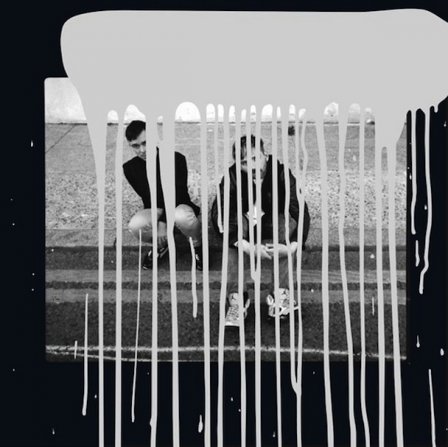Future This, the new album from London duo The Big Pink, goes decidedly — and somewhat oddly — against what one might expect from a second album, especially from a band that issued a debut of massive-sounding sonic proportions back in 2009, the much-lauded but still critically controversial A Brief History of Love. Unlike that first album, there is no opener to match the powerful, portentous gravity of “Crystal Visions” or, for that matter, any tracks that rival the near-brutal ferocity of “Velvet” or the anguished high drama of its title track. Future This differs from the band’s previous album considerably and on various levels. For the album, band members Robbie Furze and Milo Cordell have adopted a lighter thematic and emotional tone; lyrically, the songs deal with optimism, self-determination, and generally take on a more hopeful view on love and attachment, which is in contrast with A Brief History of Love’s downward spiral fixation on love and loss. The change in tone is also reflected in the music: Future This features a softer, mellower sound than its predecessor, Furze and Cordell having done away with any of the immense waves of shoegaze noise or industrial textures for which The Big Pink had been known. Still, the band’s knack for melody is intact, and coupled with such changes, the result, for better or worse, is a quite distinct turn towards music of the pop persuasion.
Furze and Cordell waste no time in declaring their ambitions on Future This, opening it with lead single “Stay Gold.” While the song hints at the band’s previous material by way of its manipulated, lightly distorted synths and guitars, and particularly its hard, dense beats, any likeness is ultimately slight: what stand out are the near-triumphant-sounding melody and idealistic lyrics, such as “Forgive your lovers/ But don’t forget their names/ And let their spirit remain/ Stay gold, gold/ Shine a light for the rest to follow.” That idealistic spirit is echoed in the Laurie Anderson-inspired following track and second single, “Hit The Ground (Superman),” as well as on later tracks such as “Jump Music,” and “Lose Your Mind.” Regrettably, for all their promise of hope and enthusiasm, most of the songs lack contrast and blur into each other, and the problem may lie in the particular way in which Furze and Cordell have interpreted pop music: their version of it is upbeat, but only to a certain degree. Consequently, Future This suffers from a debilitatingly restrained mellowness, lacking both the punch and impact of A Brief History of Love. To put it simply — and perhaps no matter what Furze and Cordell’s pop-oriented goals or intentions were for this album — their debut was going to be a tough act to follow; one can only hear so many mellow pop songs on an album, having expected half-sequels to four-minute-condensed musical epics.
Future This is not without its highlights, however. Third track “Give It Up” harks back to the first album through its dramatic chorus melody and emotionally, achingly evocative power — its lyrics express the frustrations of dealing with a lover holding back — even as musically, with its sleek production, it fits in far more comfortably with the rest of the pop-natured songs. “1313” effectively bridges the second album to the first: musically, it recalls A Brief History of Love with its harsh, sinister synths and beats; lyrically and tonally benefiting from the resulting inevitable richness and complexity, it features Furze defiantly singing, “And I will stop at nothing/ And I will be loved or die trying,” though also with an ambiguous and uncertain inflection. In the absence of the kind of music that attempted to take you by force with pummeling beats, ear-splitting walls of sound, and the intensity of its emotional anguish, both of these tracks feature a depth of purpose, musically and narratively, that is sadly lacking elsewhere.
That Future This is essentially a pop affair attests to the defiance and conviction of Robbie Furze and Milo Cordell as artists. If only conviction had been more successfully transposed onto their music, the band could have produced a follow-up that would not have had to contend with standing in its predecessor’s large, looming shadow.
More about: The Big Pink


